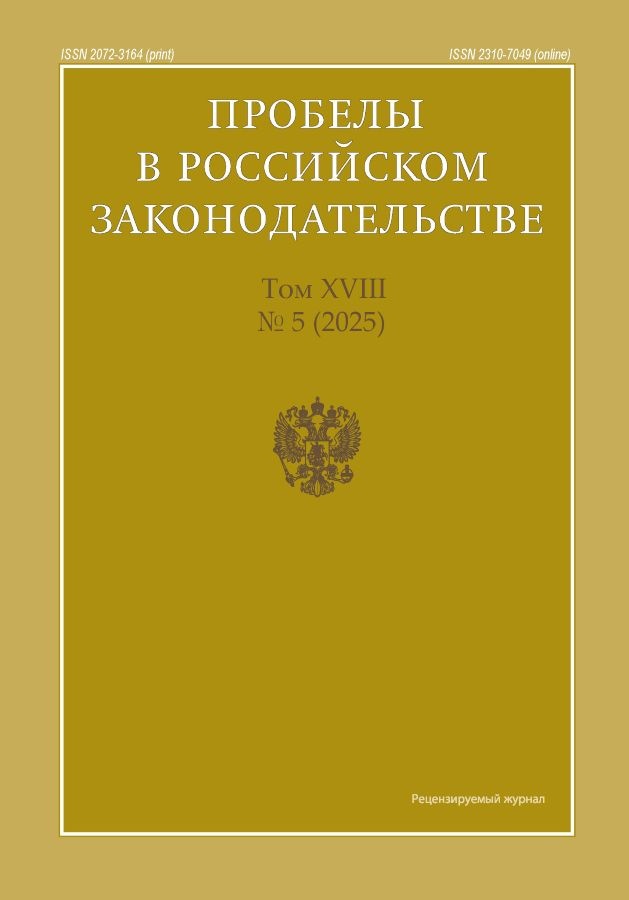Legal foundations of digital sovereignty in the Russian Federation
- 作者: Spartak S.A.1
-
隶属关系:
- Lomonosov Moscow State University
- 期: 卷 18, 编号 5 (2025)
- 页面: 25-34
- 栏目: Public Law (State Law) Sciences
- URL: https://journals.eco-vector.com/2072-3164/article/view/694133
- DOI: https://doi.org/10.33693/2072-3164-2025-18-5-25-34
- EDN: https://elibrary.ru/SENMDB
- ID: 694133
如何引用文章
详细
The relevance of digital sovereignty is driven by challenges in the field of national information security, trends in global digital policy, and the growing competition among states in cyberspace. The aim of the study is to analyze and systematize the legal framework of digital sovereignty in the Russian Federation. The study analyzes key normative legal acts that form the basis of national digital sovereignty (including Federal Laws No. 242, No. 187, No. 90, etc.). Special attention is given to strategic documents, including the Information Security Doctrine and the National Security Strategy of the Russian Federation, which define state policy in this area. The study examines the practice of implementing these measures and identifies the main challenges, among which are increased Internet censorship, fragmentation of the Internet along national borders, and a persistent technological dependence on foreign technologies that hinders the achievement of digital independence. Additionally, the study evaluates the prospects for the development of legal regulation in light of the rapid development of new technologies (artificial intelligence, the Internet of Things, 5G/6G networks), which bring new challenges and require updating legislation to ensure digital sovereignty. Overall, the need to achieve an optimal balance between strengthening national digital security and preserving freedom in the digital space is emphasized.
全文:
作者简介
Sergey Spartak
Lomonosov Moscow State University
编辑信件的主要联系方式.
Email: sspartak@yandex.ru
ORCID iD: 0009-0007-3494-6127
SPIN 代码: 9147-1725
Cand. Sci. (Polit.), Associate Professor of the Department of Philosophy of Language and Communication, Faculty of Philosophy
俄罗斯联邦, Moscow参考
- Avdiyskiy V.I., Ivanov A.V., Tsaregorodtsev A.V. Interrelation of digital sovereignty and digital space: new challenges and prospects. Bulletin of Eurasian Science. 2024. Vol. 16, No. 3. 19 p. URL: https://esj.today/PDF/21FAVN324.pdf (accessed: 02.09.2025).
- Zinovieva E., Bai Ya. Practice of digital sovereignty in Russia and China. Russian International Affairs Council (RIAC) analytical article, 29.05.2023. URL: https://russiancouncil.ru/analytics-and-comments/analytics/praktika-tsifrovogo-suvereniteta-v-rossii-i-knr/ (accessed: 01.09.2025).
- Zulfugarzade T.E., Pershina Yu. O. Development of legal support for digital sovereignty of the modern state using the example of Russia. Economics. Law. Society. 2024. Vol. 9, No. 3. Pp. 128–133.
- Morzhakova M. Sovereignty on the Web: the Russian way. New Prospect. 21.05.2024. URL: https://newprospect.ru/news/articles/suverenitet-v-seti-rossiyskiy-put/ (accessed: 01.09.2025).
- Practice of digital sovereignty in Russia and China. Russian International Affairs Council (RIAC) analytical article, 29.05.2023. URL: https://russiancouncil.ru/analytics-and-comments/analytics/praktika-tsifrovogo-suvereniteta-v-rossii-i-knr/ (accessed: 01.09.2025).
- Savelyev A. Russia’s New Personal Data Localization Regulations: A Step Forward or a Self-Imposed Sanction? HSE Working Papers. 2016. URL: https://pravo.hse.ru/data/2017/03/22/1169832328/2015 %20Savelyev%20AI%20Russian%20New%20Personal%20Da..ward%20or%20a%20Self-Imposed%20Sanction.pdf (accessed: 02.09.2025).
- Couture S., Toupin S. What does the notion of "sovereignty" mean when referring to the digital? New Media & Society. 2019. Vol. 21, No. 10. Pp. 2305–2322. URL: https://journals.sagepub.com/doi/full/10.1177/1461444819865984 (accessed: 02.09.2025).
- Obradovic D. Russia’s "Sovereign Internet" Law. Internet Society Internet Fragmentation Insights, 01.12.2023. URL: https://www.internetsociety.org/resources/internet-fragmentation/russias-sovereign-internet-law/ (accessed: 01.09.2025).
- Stubbs J., Ostroukh A. Russia to ban Telegram messenger over encryption dispute. Reuters, 13.04.2018. URL: https://www.reuters.com/article/russia-telegram-block-idUSKBN1HK10B (accessed: 01.09.2025).
- Walker S. Russia blocks access to LinkedIn over foreign-held data. The Guardian. 17.11.2016. URL: https://www.theguardian.com/world/2016/nov/17/russia-blocks-access-to-linkedin-over-foreign-held-data (accessed: 01.09.2025).
补充文件








